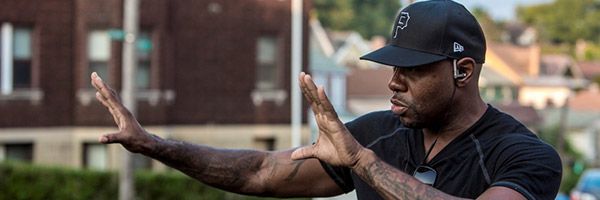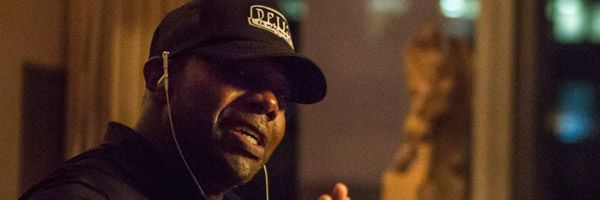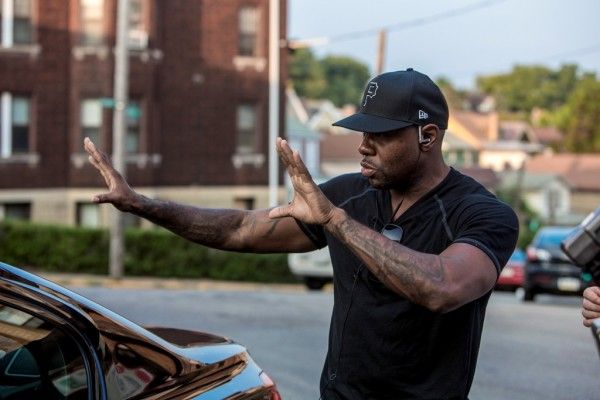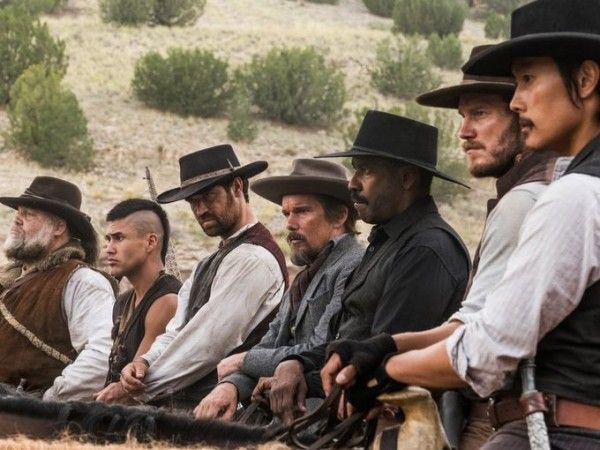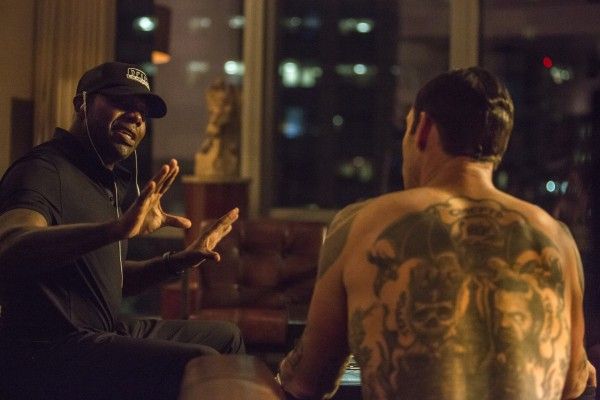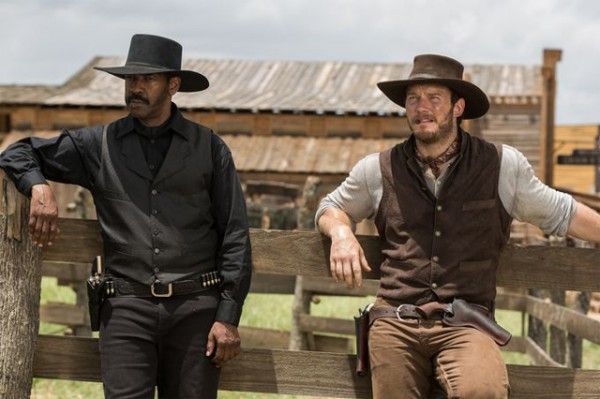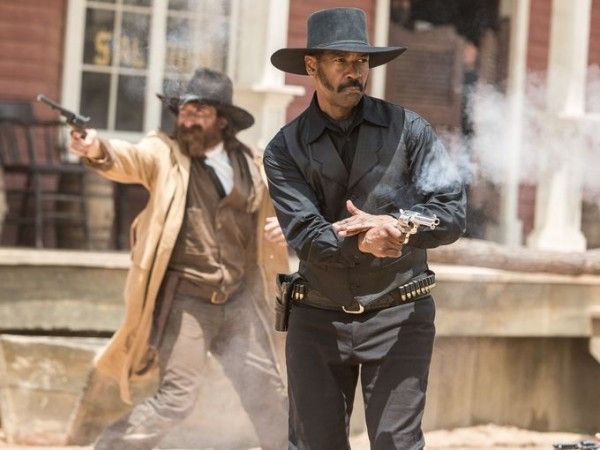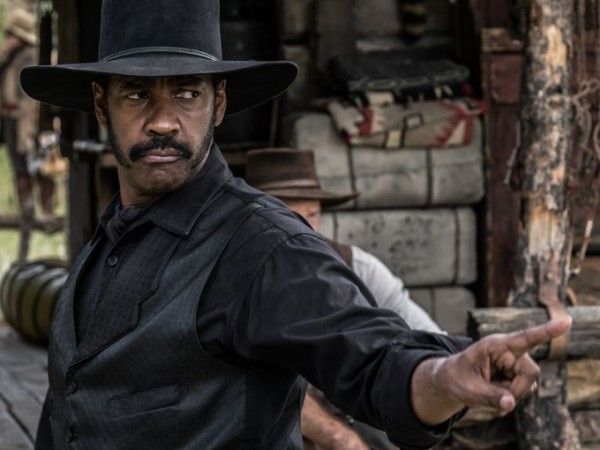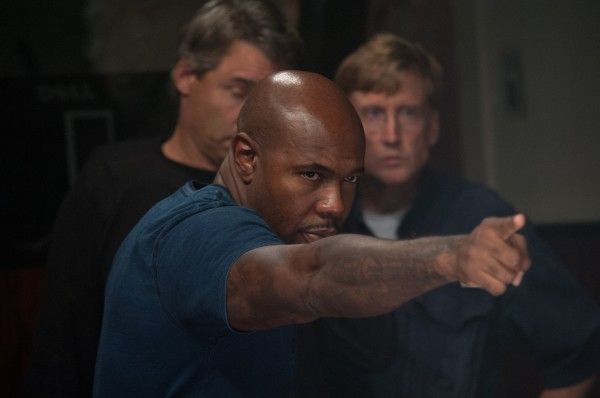With director Antoine Fuqua’s remake of The Magnificent Seven arriving in theaters on September 23rd, Sony invited me – along with a few other reporters – to watch about fifteen minutes of the movie in the editing room and then talk with Fuqua about the film. If you’re not familiar with the original The Magnificent Seven, which was itself a remake of Akira Kurosawa‘s Seven Samurai, it’s a pretty simple story: a town in the old west hires seven outlaws who band together to protect a small town from a violent industrialist. Like the previous version, the main reason to see this film is the sight of major stars working together and having fun kicking ass. Based on the footage, that’s exactly what we’re going to get.
If you saw the trailer you got a glimpse of the all-star cast, but if you’re just hearing about the remake, Fuqua invited all of Hollywood to the party and most of them said yes. The cast includes Denzel Washington, Chris Pratt, Ethan Hawke, Vincent D’Onofrio, Byung-Hun Lee, Manuel Garcia-Rulfo, Martin Sensmeier, Peter Sarsgaard, Haley Bennett, Matt Bomer, and a number of other familiar faces.
During the group interview, Fuqua talked about how the project came together, honoring the Seven Samurai influence, bringing diversity to the Wild West, landing his incredible cast, James Horner’s final score and how he was one of the main reasons the project was made. Plus, what he learned from test screening the movie, the rating, working with Denzel, and so much more. Check out what he had to say below.
ANTOINE FUQUA: Throw it at me!
QUESTION: We’ll talk a little bit about throwing together this cast, obviously. You’ve put together something special. Talk a little bit about how you landed them and how it came about.
FUQUA: Well, first I had a meeting with MGM discussing the cast, obviously. And the first question is who’s going to be Yul Brynner and who’s going to be Steve McQueen? There was a list of people, and great people on the list. For me, I just said I think it needs to be more of a modern event and more diverse. And I said, “How bout Denzel Washington for Yul Brynner’s character?” And there was a bit of a hush that feel over the room for a lot of reasons. First was do you think he would even do it? A Western? The second was the obvious, that he’s African-American. And I said for all those reasons, that’s why we should try to get Denzel Washington to do it. So they said, “Antoine, if you can get him.” So I sent the script to Denzel, flew to New York, sat down with him, I grew up loving Westerns, loving this movie. We had lunch together and by the end of the lunch he said he’d read it and he read it ,and Denzel called me and said, “Alright, let’s do it. Let’s make your Western.”
And then it was the Steve McQueen. I wanted Chris Pratt and he was looking at some other stuff. And I got Chris on the phone and Chris was singing ‘Oh Shenandoah’ already. I said, “You love Westerns?” And he said, “That’s all I watch is Westerns, and I always wanted to be in a Western.” I said, “Well, Magnificent Seven.” We talked about it and had a meeting after that and Chris signed on. Ethan Hawke was actually the first one because Ethan Hawke heard I was going to do it when I was on Equalizer in New York and literally cornered me and grabbed me by the collar and said, “If you do this fucking movie, I’m in it! I don’t care what role I’m playing.” And I said, “Of course, Ethan. I thought it would be great to get you and Denzel back together anyway.” And then, Vincent D'oNofrio, they kinda all reached out to me as well, to say, “Hey, I’m in.” So it was coming together that way. The hardest one was finding the Native American, Martin. Just trying to find someone, you know he was a young guy, felt contemporary but yet he’s authentic, he’s the real deal. And he can act with all these guys without being intimidated, when you’ve got this type of talent. And it just kind of started all falling together like that. So, yeah. It wasn’t as difficult as you may think it would be to get everybody together to make Magnificent Seven. And to do a Western.
Speaking of Westerns, you’ve worked in so many different genres. How different is it other than the obvious?
FUQUA: I mean, it has its own challenges, it’s an outdoor adventure. That’s always tough. Horses do whatever they want to do, I’ve been there before. The heat is something you just don’t think about because you're just so excited to do it. Then you’ve got horseflies bigger than you flying around and it’s 110 degrees and the weather changes all of the time, that you just don’t think about until you’re in it. And then you’re like, the be careful what you wish for days. But, I think the biggest challenge of a Western is being true to a Western but then making it your own. Because they’ve been done, Westerns. For me, Westerns have changed a lot over the years. And luckily I’m a student of them because I grew up loving them so much and watched them change from the wholesome John Wayne Westerns to The Searchers, where it went darker, going to Vietnam. You know, True Grit in those times, and then all of a sudden the anti-hero came along with Clint Eastwood, Sergio Leone. Man’s movies, more physical and tougher. So for me, the hardest part was making sure it felt contemporary and not what people consider old-fashioned but respectful of the genre. I shot it on film, I shot anamorphic, made sure we had scope, focus on the characters, still wholesome values without trying to make it western. Western speak and everybody, the cliches you can fall into. That was the hardest part, I think. Attacking it, and then staying true to Kurosawa, Seven Samurai, which is one of my favorite movies. Trying to stay true to the elements, the DNA of it.
Are we hearing James Horner’s final score here?
FUQUA: You’re hearing a lot of it. Well, yeah, we just did an 80-piece orchestra so a lot of it’s not in it yet, you heard a lot of the temp stuff as we put it together. But a lot of that is James, which I’m excited about.
I heard, maybe I’m wrong, but the grapevine is telling me that you might have more of a modern soundtrack to this.
FUQUA: Yeah, I mean a lot of stuff you heard, like during the takedown, that’s Horner’s.
I was thinking more like maybe hip-hop or…
FUQUA: Nah.
So nothing like that?
FUQUA: No, I wouldn’t do it. I mean, it has more bottom sometimes. Like I said, we have an orchestra, but it has a bigger bottom. Part of it wasn’t just hip-hop to me, what it is is I was trying to pay homage to a lot of Kurosawa’s with the bigger drums. And nowadays they call it more bottom, in hip-hop music it’s the base. But it’s actually from a timpany type of rhythm. So I would not put hip-hop in the Magnificent Seven. By any stretch of imagination. But the score itself feels contemporary. Like I said, 80-string orchestra, we don’t even get to do that much anymore. So that was fascinating to sit there and see all these, the greatest, one of the greatest orchestras in the world. The strings and the drums, it was fucking amazing to watch that. You don’t get to do that anymore. And adding a modern twitch, there are some sounds that feel more electrical. Electronic and things like that. That’s the modern. That’s as modern as I would go. I’m not going to put hip-hop in a Western, I love them too much.
I want to make sure I understand correctly how it happened, James Horner, you thought he hadn’t written it yet before he passed and then you found out he kind of wrote it.
FUQUA: Yeah, I was shooting and I got a call that he had died. That was a tough day. You know, it was hard to discuss composers with anybody. I figured out how to do it later on in post. And Simon [Franglen] and Maria, his agent and Simon and Joey had been working with Horner for 30 something years on all his music and they said “We want to come down and visit you, James left you a gift.” And I thought it was a gift. Because I went to James’ house and he has these amazing toys from around the world, I mean it’s like walking into a beautiful mind, it’s the most amazing thing I’ve ever seen in my life. He was into all these trinkets and like, he had tornado makers and toys from the 1800s, it was just amazing. He had no film, nothing. No Academy Awards, no posters, it was all toys and beautiful things. And he loved airplanes hanging from the ceiling. In no particular order, by the way. Rooms and rooms full of it. It has to be worth hundreds of millions of dollars.
I thought it was something from there that he showed me when I went to go hear the music for Southpaw. And they came down and they said that James had written a lot of the score from the script for you, he was going to surprise you. And it kind of just blew me away, I thought, “How do you do that? How’s that going to sound?” And they played it for me and it just blew me away, it was glorious. It was just like, the guy’s a genius. Because he was trying to get ahead of it. And we had discussed doing that. But I didn’t know he was going to actually write it, actually have an orchestra do it. It’s almost like, how do you know you’re going to pass away? Of course, I don’t know if he knew that, but that’s a weird feeling. That someone can write to your script and give it to you after he’s gone.
Did you have to bring anyone in to kind of finish?
FUQUA: Yeah, his guys did it. Simon and Joey and all of them. The guys had been working for him for years, they’re all composers in their own right, but they did it. They came in and they gave it their all and they’ve been amazing. Really amazing.
The original has such an iconic theme, and we heard it reworked a bit here and it sounded pretty fucking awesome. Can you talk a little bit about what conversations were like with James about how and when to use the theme?
FUQUA: What was weird is that we didn’t get to have a whole lot of conversations with James about that. I tell you a quick story with James. James always says the reason I should wind up making the movie is because when I was doing Southpaw, I went to his house and before we even went inside his room, we stood outside in his garden area. And I was just fucking complaining, to be frank. Couldn’t get the money, it took seven actors, movie stars, the whole Hollywood system sometimes is tough. And you gotta get a certain level of actor to get the money to make a Western because Westerns, all this shit. And I just wasn’t feeling the love at that moment. And I was trying to get Denzel at that point to agree to the deal and everything. And I sat with James, and I said, “I don’t know if I’m going to do it, I’m having a tough time trying to get the money to match the level of actors, blah blah blah.” And he started telling me about, in Calabasas, just out of the blue, he said, “You know, they used to ride horses out here in Calabasas. There used to be a whole horse trail,” and he started telling me all this stuff. And if you guys have ever met him, he’s a slight guy, soft-spoken and he kind of look at me and said, “You have to do it.” He said, “Antoine, you’ll make history. You, Denzel, Chris, Magnificent Seven. Don’t worry about the money, I’ll do it for whatever. But you gotta make that movie. You’ll probably never get to make another Western in your lifetime, you just gotta figure out how to do it.” And I was just looking at him, it was a weird little moment where I thought, “Fuck yeah, you’re right I gotta figure this out. I gotta stop fucking whining and figure out how to do it.”
And after that I called Chris and I called Denzel and I said, “If I do this, we can shoot it here and if I do this…” And I call Gary Barber, and I said, “If I can get these guys to say yes to X, Y and Z, I need an answer by Monday.” And he said, “If you can get them to all say ‘yes’ to that, I’ll get you your money.” And everybody said yes. But it was James that fueled it. It was that idea like, you get to make a movie, man. Fucking figure it out, stop whining. It’s a Western. And he was right. So, we didn’t talk about the score, it was more about, figuring out ways to make movies regardless of how difficult they might be. And that’s really what we talked about. So, that’s as far as our conversations went. We talked about the original score and stuff, but not what he was going to do. I just know James would bring his own creativity to it.
What have you learned from any friends and family screenings or test screenings that have impacted the finished film? Or where you are now?
FUQUA: I learned a lot. We did two test screenings, we didn’t do friends and family. But, both test screenings scored really high, really high. I learned that people actually laughed way more than any movie I think I’ve made, and a couple times I thought that I made a comedy and didn’t know it. It was fun. I didn’t realize how much fun it was. Because I’m just in it a little heavier. And I watched the audience just laughing, having a great time and clapping, cheering. Just having fun. And at the end of it, when we did test screenings and we said, “Well, what did you love the most about the movie?” And they all raised their hands and said, “It’s a Western.” And that’s what it is, it wasn’t trying to be anything else, it wasn’t not a hip-hop Western, it’s a modern Western. It felt modern and very of their time, but a Western. And they love that idea.
And they love the characters, they loved the guys. They loved all of them. Vincent D'Onofrio was amazing, through the charts, Denzel of course, and Chris, through the charts. Then they loved the Native American guy, like way more than I even realized. They just loved Martin! He didn’t even say much in the movie! But they really connected and a lot of people talked about why they felt it was was important to have a diverse cast like that. They were surprised and they were happy. They said it felt like the right thing to do at the time, where our world is with the tyranny. That it takes all sorts of people to come together to fight tyranny. Not just one race anymore, you can’t make that movie anymore where it’s just the white guys on the horses who save the day, it doesn’t work. The world has changed and it seems like it takes all of us to come together to fight tyranny. And it seemed to me that that’s what they were responding to. A lot of them were commenting on it, “It’s so cool he’s a Native American, it’s so cool there’s an Asian guy, it’s so cool there’s Denzel.” They just really locked into that, the idea that it was diverse, so. That was a big deal. That’s what I learned a lot from the test screenings.
The first movie is so iconic, and sort of follows the plot of Seven Samurai to the letter. What did you want to keep from that plot path and then what was the important stuff to you to keep and what was the stuff that could kinda go?
FUQUA: Well, from Seven Samurai, because that movie’s so long, it’s a great movie but I think it’s 3 hours. One thing I really wanted to keep was the DNA of the characters. Denzel’s character is quiet, like in Seven Samurai, he was very quiet and stoic. He was a dark figure, but he was a samurai, he had his own demons. I like, Mifune, his character’s funny and always mischievous, that was Chris. I did some scenes where you see Chris giving Manuel always a hard time, he does that quite well. Good night, obviously from the original Magnificent Seven being PTSD but considered then just a coward, but now we know more about what that was. And the battle scene at the end is fucking epic. Hundred some horses storming down a hill, big. I wanted to keep that scale of the epic size of that final battle like Kurosawa did, which was it was more a war ultimately than just a skirmish.
But most importantly I wanted to keep the idea of tyranny alive. You didn’t see the beginning, it’s pretty heavy. They burn down the church and they kill people, it’s very much like terrorism. Kurosawa has dealt with that a lot, how they would just take the people’s land. That sort of idea. Well, they did it in Magnificent Seven as well, but it was all about tyranny. And living under the thumb of a different group. The DNA stayed the same. I’ll tell you, the thing I learned a lot on King Arthur is how these things, when you’re younger you don’t realize it, now I realize it because it means so much to me. These movies, how much they mean to people. People who saw it when they were 10 with their dad or their mom or their grandma. There’s a time and place where these movies have a special meaning to people. And you have to be true to that, obviously making it more contemporary, they have to be true to what it means to people. The DNA of it should not change if you’re going to remake that movie. So I learned a lot from that movie. I learned that lesson that it means a lot to people. So I stayed true to the film in that sense.
We saw posters around for other Westerns, I wonder if you could talk about other Westerns that were influential.
FUQUA: I mean, The Wild Bunch, for sure. My version of this is, they’re a little more The Wild Bunch than The Magnificent Seven, a little tougher, a little meaner. The Wild Bunch was certainly influential, no question. The Sting, that wasn’t so much a Western, but Butch Cassidy and the Sundance Kid was fun and it had charm about it. That was interesting because the tone of that was funny, if you look at that movie. It was dark in a way, it’s hard to find a tone like that that works. Where there’s humor inside of this intensity. But you know, I grew up watching the Sergio Leone's, like I said man, John Ford’s Westerns for the scope a lot, more than the characters for me. Until later, until they got a little darker, they felt a little too clean in the beginning. Nice to watch on a Sunday with your grandma, but you can watch Bonanza for that. So yeah, I grew up watching those films, a lot of them were influential. Sergio Leone’s the one I’m really, I responded to the most. I think it was just because it was always an anti hero. Clint was just the man. I don’t think anybody’s done it as well as Clint Eastwood, really, in my opinion as far as that god. So, you know, that’s what I grew up watching. The most influential films for me. Duel in the Sun was a good one. Because again, it was a little darker version of a Western. Yeah. Like I said, man’s movies were influential. If I can sit here and think about it I can go on and on. But I’m that kid who grew up watching Westerns and gangster movies and war movies, that kind of thing.
Talk a little bit about the rating you’re going for, and was there any discussion about going in a different direction with it?
FUQUA: Well it was always a PG-13 and that’s the rating it still seems to be. Right on the edge, hopefully of PG-13. Nowadays you never know with PG-13s, but it’s right on the edge. I wasn’t going for gore or anything, I didn’t want to do that, but I wanted to push it, make it a little hyper-reality. You know, because it is a Western it should still be fun, push it a little bit. I wasn’t going for a lot of gore and blood or anything. It is there, but it’s not over the top. But the action’s big and some ugly things that happen: horses falling, explosions, that kind of stuff.
Do you sort of feel like you’re in touch with what the MPAA will allow you to do and what they won’t allow you to do?
FUQUA: I don’t have a fucking clue. I really don’t. I don’t have a fucking clue. I was told we were going to do PG-13 and that’s what I, I kept my word on that as much as I could, for me. And I think I got it right on the edge there. You know, I don’t know man. I took my son to see some movie, it was a zombie movie and the first scene I think somebody got their head blown off. And that was PG-13. I thought, “Oh, there’s no way they’re going to make it – my movie should be easy!” And right now we’re in the middle of that discussion. Maybe it’s different standards for me, I don’t know.
I think it’s the zombie aspect.
FUQUA: I don’t know. Blood is blood, gore is gore. But that’s not my job, I let them deal with that. I’m not worried about it though, in this one. I would prefer it be PG-13. Right on the edge. Because I would like for some of the younger people to see it. It’s still got all the edge it needs without being gory. When I do another horror, it’s going all in. It’s going to be horror, baby.
In the original, part of what’s so memorable about that movie is how each character is introduced, how they get them into the gang of being seven. How did you kind of try to live up to that or do your own spin?
FUQUA: No, it’s great. Each introduction, they up each other. It’s pretty fantastic. And they all do something pretty cool that tells you a bit of who they are. Again, I kept it at DNA, each time you meet a guy, you gotta up the ante, each person has their own introduction, it matches their personalities in a whole different environment. And that kind of thing. That’s their, that’s strong.
Is it fun to kind of just jump into the ensemble? It seems like the model these days is we get seven different films about each character and then they’d come together.
FUQUA: Yeah, it’s fun because you know, I don’t even remember who I start off with – the first day was with Denzel. So I was like, “I’m making that movie with me and Denzel,” in my head. And then it was like, okay, now Chris is here. And then I’m dealing with Chris and introducing Chris and then I gotta introduce Chris and Denzel together. And then I’m like, “Oh, this is fun.” And then you go from Chris and Denzel to go get Good Night. And Billy Rocks, and how that comes together. Then bringing them to Chizum. And then getting that crew together. And then they go get Vincent D'Onofrio into the mountains. And that’s cool because that’s a whole different thing. And then going to get the Native American which is a whole different environment, completely how that setup happens. And interesting stuff. So that’s fantastic to do. Because it is like little mini movie of meeting each guy, then each scene shows you how they relate to each other. Then you get to start to get that dynamic. Being the director is great because that’s how you shoot it, as they’re showing up, like dress rehearsal, they’re all showing up. And you’re kind of like fresh every time. You’re like in a different environment, a different place up in the mountains. Up in Native American country or you’re in different places each time, on the desert where you meet each guy. So that’s fun to do. That was probably the most fun.
When you have a guy like Denzel who likes to get under the hood a lot on the script stage, can you talk about what he brought to that level of the project and what was your relationship like working with Richard on the rewrite?
FUQUA: Um, I mean it’s always the same, it’s a great collaboration with Denzel. Denzel just cares about the work. I think the biggest thing was how much he was focused on making sure the other guys had what they needed. A lot of times he would go, “I shouldn’t do that, Chris should do that. Chris is funny, I’m not. That’s not me.” Or Vincent. They would all meet, and we would talk about it together and discuss these ideas. It was like working in theater in a way, because you were just sitting in the room with the guys. When you got great actors, you can do that. No one’s selfish, there’s no “I’m the big dog on the set.” It was more, Denzel became more of the guy talking to Chris a lot about success and acting and some of the pitfalls. They spent a lot of time together. And Chris found himself spending time with Vincent and Ethan Hawke. They would go, what was it called, cross training, all together all the time. Go-kart racing, they became that crew. But it became a process of daily looking at the script, talking about it. Denzel’s all about the big picture, really. That’s who he is. No one was trying to steal the show, which you can worry about when you have that kind of – a lot of jockeying going on, all that stuff so. This wasn’t that movie. The hardest part about this movie was the elements, it was the weather, we were fighting the weather. And you can’t expect everybody to be happy at 110 degrees every day, on horses, in those costumes in the rain and thunder and lightning. But they were pretty cool man, we would get some cigars and sit on the porch and watch the rainfall and crack jokes. And Chris obviously would be the one leading it and Vincent. So, we had some good memories, man.

